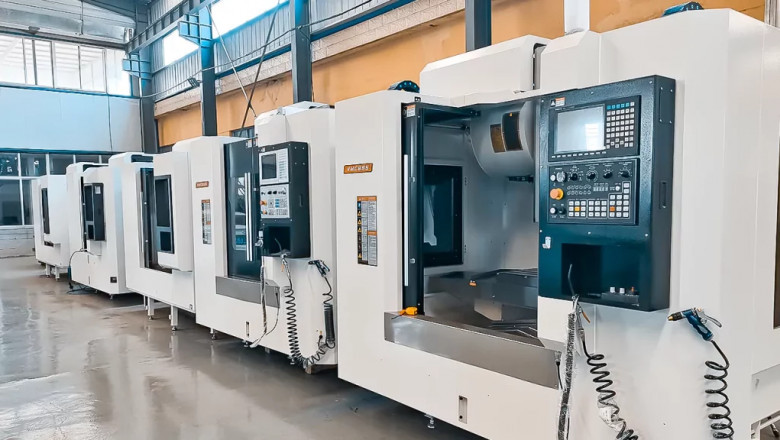views
Plastics play a vital role in CNC machining, offering engineers lightweight, versatile, and cost-effective solutions for a wide range of components.
While metals dominate structural and load-bearing applications, engineering plastics such as ABS, PEEK, and Delrin are often the ideal choice when flexibility, chemical resistance, insulation, or reduced weight are priorities.
This article explains the unique characteristics of these three popular CNC machinable plastics—ABS, PEEK, and Delrin—and helps you decide when to choose each based on your specific performance, cost, and design requirements.
Why Use Plastics in CNC Machining?
CNC machining is not just for aluminum or steel. High-performance plastics offer key advantages:
-
Lighter weight compared to metals
-
Lower cost per part (especially for prototypes and short runs)
-
Electrical insulation properties
-
Resistance to chemicals, moisture, and corrosion
-
Easier to machine and faster to process
-
Lower thermal conductivity in sensitive applications
Plastic CNC parts are commonly used in medical devices, automotive components, electrical insulators, consumer products, and industrial equipment where weight, resistance, or flexibility matter.
ABS: The Versatile, Cost-Effective Plastic
What is ABS?
Acrylonitrile Butadiene Styrene (ABS) is a thermoplastic polymer known for its toughness and ease of machining. It’s one of the most widely used plastics in prototyping and functional applications.
Key Properties:
-
Lightweight and rigid
-
Good impact resistance
-
Easy to machine and finish
-
Relatively low melting point (~105°C)
-
Electrically insulating
-
Affordable for low-cost prototyping
Best Use Cases:
-
Prototypes and visual models
-
Consumer product housings
-
Enclosures for electronics
-
Low-load mechanical parts
-
Fixtures and alignment tools
Pros and Cons:
| Pros | Cons |
|---|---|
| Inexpensive and available | Lower heat resistance |
| Easy to glue, paint, or bond | Not suitable for sterilization |
| Good dimensional stability | Less chemically resistant than PEEK |
ABS is ideal for early-stage development and testing. It performs well in environments without high thermal or chemical stress and is especially popular for cost-sensitive applications.
PEEK: The High-Performance Engineering Plastic
What is PEEK?
Polyether Ether Ketone (PEEK) is a high-performance thermoplastic used in demanding environments. It offers exceptional strength, thermal stability, and biocompatibility—making it one of the most advanced plastics used in CNC machining.
Key Properties:
-
High strength-to-weight ratio
-
Continuous operating temperature up to 260°C
-
Excellent chemical and hydrolysis resistance
-
Inherently flame retardant
-
Biocompatible (FDA, ISO 10993 compliant)
-
Radiation and steam sterilization compatible
Best Use Cases:
-
Medical implants and surgical instruments
-
Aerospace components exposed to heat and pressure
-
Oil & gas and chemical processing parts
-
High-performance electrical connectors
-
Precision bushings and bearing elements
Pros and Cons:
| Pros | Cons |
|---|---|
| Superior mechanical performance | Expensive material cost |
| Sterilization and radiation safe | Requires high-precision machining |
| Excellent wear and chemical resistance | May need post-processing for tight tolerances |
PEEK is the plastic of choice when high strength, chemical resistance, and thermal endurance are critical. It’s often machined on high-precision CNC lathe machines to achieve tight tolerances and complex geometries.
Delrin (Acetal): The Low-Friction Workhorse
What is Delrin?
Delrin is the brand name for polyoxymethylene (POM), a strong, low-friction engineering plastic often used in moving parts and wear-resistant applications.
Key Properties:
-
High dimensional stability
-
Low coefficient of friction
-
Excellent wear and abrasion resistance
-
Good mechanical strength
-
Low moisture absorption
-
Easy to machine and polish
Best Use Cases:
-
Gears, cams, and pulleys
-
Bushings, bearings, and sliding components
-
Mechanical linkages
-
Electrical insulators
-
Valve seats and fluid handling components
Pros and Cons:
| Pros | Cons |
|---|---|
| Excellent wear resistance | Not suitable for high heat (>90°C) |
| Good for tight-tolerance parts | Poor bonding and paint adhesion |
| Resists water and fuel | Sensitive to UV exposure |
Delrin is the best choice when you need smooth, wear-resistant plastic for dynamic parts. It performs especially well in mechanical assemblies that require low friction and high accuracy.
Side-by-Side Comparison: ABS vs. PEEK vs. Delrin
| Property | ABS | PEEK | Delrin (POM) |
|---|---|---|---|
| Cost | Low | High | Medium |
| Machinability | Excellent | Good (needs precision) | Excellent |
| Max Operating Temp | ~105°C | ~260°C | ~90°C |
| Chemical Resistance | Fair | Excellent | Good |
| Wear Resistance | Moderate | High | High |
| Strength | Moderate | High | Moderate–High |
| Biocompatibility | No | Yes | No |
| UV Resistance | Moderate | Excellent | Low |
| Sterilization Ready | No | Yes | No |
| Best For | Prototypes, enclosures | Medical, aerospace, high-heat | Bearings, gears, sliding parts |
Choosing the Right Plastic: Key Considerations
When selecting between ABS, PEEK, and Delrin for CNC machining, consider the following factors:
-
Operating Environment: Will the part face high temperatures or chemicals?
→ Choose PEEK. -
Functionality: Does the part need to slide, rotate, or wear over time?
→ Choose Delrin. -
Budget and Speed: Do you need a low-cost, fast prototype?
→ Choose ABS. -
Medical or Aerospace Compliance: Is the application highly regulated?
→ Choose PEEK for FDA, ISO 10993, and high performance. -
Precision Requirements: Do you need tight tolerances or smooth finishes?
→ Delrin and PEEK are both ideal for high-precision machining.
Final Thoughts
Plastics are not one-size-fits-all in CNC machining.
ABS, PEEK, and Delrin each serve unique roles based on the requirements of your application—be it structural strength, chemical resistance, low friction, or cost control.
Choosing the right plastic means balancing performance, environment, and budget. When precision machining is required, partnering with an experienced shop that understands material behavior is essential.
To explore CNC machining of high-performance plastics on advanced lathes and mills, visit our high-precision CNC lathe machines page and discover how we handle complex plastic parts with accuracy and speed.














Comments
0 comment